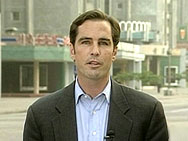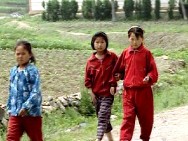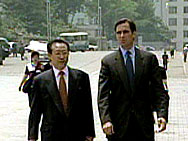What ABC Told Us–and Didn’t Tell Us–About Life in North Korea
“It will be fascinating for us and for our audiences to see what life is like there and try to get a snapshot of everyday existence inside North Korea,” [ABC News president] David Westin said.
 ABC News has now aired its series of reports from inside North Korea, and I waited until I’d seen them before I made up my mind. Having fought my way through the wretched, insufferable, life-sucking crap-tangle known as Real Networks to see the reports, I can confidently deflate the hopes of anyone who had been tapping his fingers on the counter of the one-hour photo waiting for said snapshot. It’s blurred, the colors are wildly distorted, and something that appears to be a thumb occupies the parts of the image we really wanted to see.
ABC News has now aired its series of reports from inside North Korea, and I waited until I’d seen them before I made up my mind. Having fought my way through the wretched, insufferable, life-sucking crap-tangle known as Real Networks to see the reports, I can confidently deflate the hopes of anyone who had been tapping his fingers on the counter of the one-hour photo waiting for said snapshot. It’s blurred, the colors are wildly distorted, and something that appears to be a thumb occupies the parts of the image we really wanted to see.
The report isn’t completely devoid of interesting information; the wierd emptying of North Korea’s cities for farm work is informative even through the emerald-green glasses. But “a snapshot of everyday existence inside North Korea” it isn’t. Brainwashed tour guides, privileged military officers, and terrified schoolkids are not an accurate representation of public opinion. The reporters, for their part, acknowledge that they are followed everywhere by government minders. They just don’t ever question it. They tour the world’s most repressive, controlling state, but never seek–or seek permission to seek–the unsupervised answer to what the North Korean people are really thinking.
the North Koreans
Try this experiment. Read a of any Donald Rumsfeld press conference. You will see critical questions about how many Iraqis have been trained, whether the numbers include police, and whether there is a mathematically sound basis for any of the various estimates on how many insurgents we are fighting. You will see questions on prisoner abuse that border on the hyperbolic. In short, those who are duty-bound to protect us can expect to face tough, critical questions, as they should. What, then, of the questions our journalists ask those who openly preach our destruction? Let me answer with a list of questions ABC didn’t ask the North Koreans:
 May I interview any of your citizens outside the presence of government minders?
May I interview any of your citizens outside the presence of government minders?- Before we went to Pyongyang, we interviewed some North Korean refugees in Dalian and Seoul. They told us a very different story of life in North Korea (roll video!). Can you explain this discrepancy?
- Can we visit any areas that are not part of the official itinerary?
- Approximately how many of your citizens are malnourished?
- What is your government doing to assure that all of its citizens have enough to eat (citing international aid workers’ reports on the highly unequal distribution of food)?
- Is it true that most of your starving people are in one of the lower “songbun,” or political classes?
- You criticize Secretary Rice’s description of North Korea as an “outpost of tyranny.” Isn’t it true that your propaganda depicts the killing of Americans and the destruction of the U.S. Capitol, that you once referred to John Bolton as “human scum,” that you have threatened to turn Seoul into a “sea of fire,” and that you teach your kids to practice killing our president?
- How can you explain the fact that millions of North Koreans are starving when your annual defense budget is twenty-five times higher than the amount the World Food Program is seeking to feed your hungry people?
- How many people live in your concentration camps? If the stories of concentration camps are indeed imperialist fabrications, as you say, then may I inspect the location at (give map grid coordinates).
- Finally, at one point during ABC’s guided visit to the DMZ, a voice-over notes the sound of gunshots coming from behind the trees to the right of the roadway. The reporters don’t inquire, ask for an explanation, or ask to have a look. Obviously, no North Korean guide would take a foreign journalist toward the sound of gunfire, but might the response itself be telling?
Faustian Journalism
How do experienced professional journalists who are presumably capable of critical, hard-hitting reporting turn to gelatin in the presence of such rich targets? Perhaps it has something to do with how they got there in the first place:
Months of cajoling by ABC News resulted in this week’s exclusive series of reports by Bob Woodruff from North Korea. It’s the first extensive reporting by an American network inside the country since October 2000, when Secretary of State Madeleine Albright visited, the network said Wednesday.
Woodruff began his reports from the capital of Pyongyang Tuesday on “World News Tonight,” describing a city strangely empty because residents had been sent to the countryside to plant rice, and intersections devoid of traffic lights because police directed traffic.
On Wednesday, Woodruff interviewed the North Korean representative to talks about the country’s nuclear weapons program. A day earlier, he had reported North Korean’s willingness to resume the dormant discussions.
ABC News President David Westin quietly traveled to North Korea in February to see if a news team would be allowed in. Chuck Lustig, the network’s director of foreign news coverage, took other trips to organize Woodruff’s reports. He first went to North Korea in 1995. (emphasis mine)
 Hey! It’s exclusive! What more do ya need?
Hey! It’s exclusive! What more do ya need?
For starters, some reassurance about ABC’s undivided interest in getting to the truth, free of state pressure or influence. What do I mean here? Such a lengthy, extensive, and expensive series of visits certainly suggests a careful negotiation of Woodruff’s access, after which the delicacy of official North Korea’s sensitivities would be clearly understood by all, even if not expressed outright.
And indeed, the questions were mostly softballs. How, then, does a journalist justify gutting his reporting of its skepticism when it’s need most? One way is to accept the philosophy that reporting half-truths is better than no reporting at all. This idea has a close relative in the field of diplomacy–the idea that talks, even talks which neither make nor preserve peace, are themselves a worthy objective. In this view, process is everything, results are an ever-receding horizon, and value judgments are pointless. And while it’s undoubtedly good for the gainful employement of journalists and diplomats, it carries the risk of populating the world with dangers and the public consciousness with falsehoods.
in North Korea
Then again, perhaps ABC has some institutional memory of the time it sent one of its reporters, Andrew Morse, to North Korea with the Korean Friendship Association, and Morse got a little too inquisitive:
Two days before the end of the trip, events took a turn for the worse. ABC’s Andrew Morse, who regurlarly made newsshots of himself, came into conflict with the KFA top during a particular shot at Kochang’s Cooperative Farm regarding the usage and interpretation of words describing the DPRK’s present state. It was by then clear that Mr. Cao de Benos became increasingly frustrated with Morse’s actions and started to physically threaten the disgruntled ABC Reporter en route to Nampo. The KFA leader left shortly for Pyongyang afterwards, leaving the group gazing at Nampo’s West Sea Barriage, whose finalisation can be mainly credited to the Russians.
Now nobody actually knew what Mr. Cao de Benos was up to, apart from the fact that he was nowhere to be seen. Upon return in the Sosan Hotel most of us would find out what actually happened.
Click and scroll down a bit to see the rather eerie way in which it ends. And of course, you can read more about Mr. Cao de Benos, whose emulation for Kim Jong Il extends to writing songs of adulation, wearing Mao suits, and mimicking his gestures.
“There Is Corruption in Our Business”
The entire unauthorized KFA travelogue is well worth reading, particularly if you’re a grad student in abnormal psychology. Only someone with no intention of returning to North Korea could have written it. On the other hand, if you’re a journalist with ethical questions about the obligation to ask tough questions while visiting a democidal tyranny, then heed the warning of the New York Times’s Pulitzer-winner John Burns:
Terror, totalitarian states, and their ways are nothing new to me, but I felt from the start that [Iraq] was in a category by itself, with the possible exception in the present world of North Korea. I felt that that was the central truth that has to be told about this place. It was also the essential truth that was untold by the vast majority of correspondents here. Why? Because they judged that the only way they could keep themselves in play here was to pretend that it was okay.
. . . .
Look, I don’t believe in the journalist as hero, because I think that wherever we go, and whatever degree of resolve that may be required of us, there are always much, much braver people than us. I travel in a suit of armor. I work for The New York Times. That means that I have the renown of the paper, plus the power of the United States government. Let’s be honest. Should anything untoward come to me, I have a flak jacket. I have a wallet full with dollars. I’m here by choice. I have the incentive of being on the front page of The New York Times, and being nominated for major newspaper prizes.
The people who we write about have none of these advantages. They are stuck here with no food and no money. I don’t want to be pious about this, but for a journalist to present himself as a hero in this situation is completely and totally bogus.
Burns’s entire piece is must-reading for those who haven’t already. Any hack can take the KFA tour of Pyongyang and write about the great golf courses there, but if you’re going to inform us, you have an obligation to ask hard questions, tell us everything you saw, and tell us what you weren’t allowed to see.
It wouldn’t be ABC News if it weren’t for the old vicarious commentatary trick. The scam works this way: the reporter wants to editorialize, but doesn’t want to expose himself to charges of bias. Instead, he picks a skewed sample of “experts” to speak his opinion for him, allowing the reporter to vicariously comment without saying a word.
This time, the setup was a sidebar report on the nuclear diplomacy following one of Woodruff’s reports; specifically, it described how Bush still hasn’t quite driven Kim Jong Il away from the peace table, in spite of his “rhetoric,” a North Korean argument that ABC accepted uncritically. The vicarious–and only–commenter was Wendy Sherman, one of the brain trust behind the Agreed Framework, who appears only nine months out of the year because of her seasonal employment as an animatronic Mrs. Claus in the window of a Macy’s near you. Wendy wants you to understand the North Koreans–the ones who watch the missiles from the big reviewing stand–and to be sensitive to their needs and feelings. And what does that require of us? First, this awful rhetoric really must stop, by which Ms. Sherman means “irresponsible” and “outpost of tyranny,” but definitely not “human scum,” “sea of fire,” or “bastard.” Furthermore, Sherman says, we must recognize North Korea’s “sovereignty,” which means–and this is a direct quote–“its right to govern in its own way.”
We may have come within three percentage points of an official U.S. stamp of approval on North Korea governing in its own way, to our nation’s eternal shame. After all that ABC saw and never questioned in the course of its reports, not questioning Ms. Sherman on this astonishing statement may have been its worst lapse of judgment of all.
3 Responses